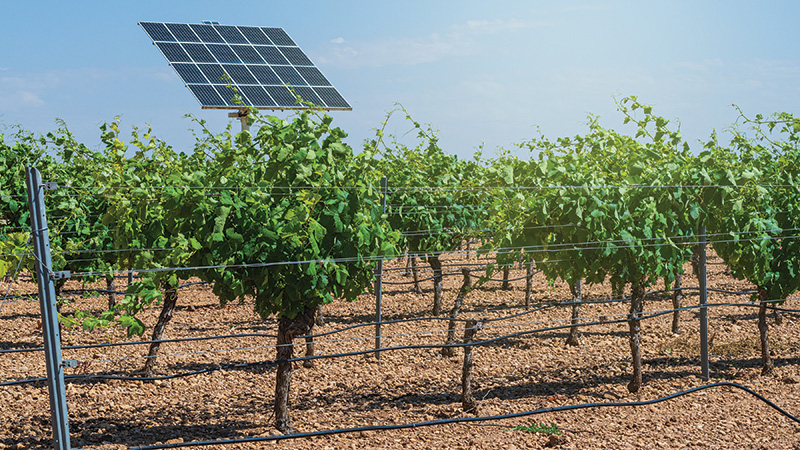News Bites
This article was originally published in March 2022

Sustainable wine
The Washington wine industry is putting the finishing touches on a third-party sustainability certification program that will allow wineries using the certified grapes to label their bottles as such. Under the program, the term “sustainability” will cover a variety of topics: from business plans to worker conditions and pest management practices to water management. The effort started about 20 years ago, when the industry spent more than $1 million in industry contributions and grant funds to create Vinewise and Winerywise, voluntary self-assessment programs. (GoodFruit.com)
Soda tax impact
Armed with three years of grocery shopping data, researchers found that total sugar sales are down by almost 20%, driven largely by falling soda purchases. In a recent analysis, researchers used a large set of grocery shopping data to track food and drink sales before and after the city of Seattle implemented a sugary drinks tax in January 2018. To create a control group, researchers also obtained the same data for the nearby city of Portland, Oregon, which doesn’t have a sugary drinks tax in place. (TheCounter.org)
Gluten-free beers
Using a modified, lower temperature mashing procedure to retain enzyme activity, brewers can use malts from gluten-free grains to produce high-quality beers, according to Penn State researchers who conducted a new study. The research promises to result in brewers using gluten-free grains such as teff, sorghum, rice, millet, corn and buckwheat to produce better-tasting beer for consumers with celiac disease or other gluten intolerances. Producing gluten-free beer from gluten-free malts is difficult, generally, because gluten-free malts have lower enzyme activities, noted researcher Darrell Cockburn, assistant professor of food science in the College of Agricultural Sciences, whose research group focuses on the human gut microbiome, carbohydrate-active enzymes, dietary fiber and resistant starch. (PSU.edu)
Urban light affects seasons
If you live in a big city, you might see trees start budding even before spring officially arrives. An article published in the journal Science found that trees in urban areas have started turning green earlier than their rural counterparts due to cities being hotter and also having more lights. “[I] found artificial light in cities acts as an extended daylight and causes earlier spring greening and later autumn leaf coloring,” author Lin Meng said. (NPR.org)
Medicinals for bees
The United States Department of Agriculture (USDA), Agricultural Research Service (ARS) researchers from the Bee Research Laboratory in Beltsville, Maryland, and collaborators found some natural products’ medicinal properties reduced virus levels and improved gut health in honeybees. Among the study’s results, which were recently published in Applied Sciences, researchers found a significant reduction in virus levels in bees fed raw cacao and hesperidin, a plant chemical commonly found in citrus fruits and other fruits and vegetables. There were also lower levels of viruses in bees fed chrysin, curcumin and vanillin. (ars.usda.gov)
Europe’s BPA standards
Scientists have known for decades that bisphenol A, or BPA, a plastic additive used in products like food storage containers and food can liners, is harmful to human health. The European Food Safety Authority, or EFSA, has proposed new safety standards for BPA, radically scaling down the recommended exposure limit by a factor of 100,000, to just 0.018 nanograms per pound of body weight per day. The new standard, based on years of scientific evidence of BPA’s harms to people’s immune systems and bodily development, is so low that it would all but bar BPA from use in any products that come into contact with food. (Grist.org)
GMO labeling change
Starting Jan. 1, labels at the grocery store (received) a makeover on foods that have been genetically modified. The goal was to get rid of the patchwork of different labels for foods and ingredients that have been scientifically tinkered with, according to USDA. Foods that previously were labeled as containing “genetically engineered” (GE) ingredients or “genetically modified organisms” (GMOs) will now be labeled as “bioengineered,” or come with a phone number or QR code guiding consumers to more information online. (WashingtonPost.com)

Tribal clam garden
Swinomish tribal members are preparing to build a clam garden along a roughly 200-foot section of shoreline of tiny Kiket Island, just northwest of La Conner. Marine ecologist Courtney Greiner, who is employed with the tribe, describes clam gardens as low human-made rock terraces in the intertidal zone. If the Swinomish build theirs, tribal members and clam garden experts say, it would not only provide opportunities for cultural connection, food and knowledge sharing, but they believe it would be the first modern-day clam garden in the United States. (Crosscut.com)
School flour mill
Shandon Elementary in San Luis Obispo County in California will be the first public school in the U.S. to make its own flour using a stone mill on site. A California Department of Food and Agriculture (CDFA) grant, which is funded through March 2023, will cover the cost of the mill and two pasta extruders as well as the training for cafeteria staff to use both. Two additional grants—one awarded to Shandon Joint Unified School District and the other to nearby San Miguel Joint Union School District, both along California’s central coast—will buy enough whole grains from local farmers to provide both districts with freshly milled flour for nearly two years. (CivilEats.com)
Pork industry consolidation
Seventeen pork slaughter plants processed more than 3 million hogs in 2020, accounting for 65% of the nation’s pork production, according to a USDA working paper. More than half of all federally inspected pork slaughter plants in the U.S. process fewer than 1,000 hogs annually, but these small plants accounted for only 0.1% of pork production in 2020. The working paper analyzed the impact of COVID-19 on pork slaughter rates in the U.S. and found that the number of hogs slaughtered dropped in the first few months of the pandemic before recovering to match—and in some cases exceed—2019 levels. (investigatemidwest.org)
Understanding food labels
Vermont Law School’s Center for Agriculture and Food Systems (CAFS) recently launched the Labels Unwrapped website to help consumers in the United States better understand labels on food packaging. The website (labelsunwrapped.org) helps readers learn about nutrient content claims, government and third-party regulation and certification, and expiry dates. Government agencies including the U.S. Food and Drug Administration (FDA) provide resources about food labels, but CAFS director and professor of law Laurie Beyranevand says these are often intended for producers. (FoodTank.com)
Top-trend recipes
Social media trends heavily influenced the most-searched-for recipes in 2021, judging by a 2021 Google roundup. The top 10 trending recipe searches on Google were for TikTok pasta, bacon jam, Birria tacos, Crockpot chicken, Hamantaschen, Squid Game cookie Baked oats, Cicada, Gigi Hadid pasta and smashed potatoes. (trends.google.com)
Plastic pollution report
A panel of experts has made a simple, commonsense recommendation for dealing with the U.S.’s plastic pollution problem: Stop making so much plastic. “Not producing waste in the first place is the best thing you can do environmentally,” said Jenna Jambeck, a professor at the University of Georgia’s College of Engineering and a coauthor of a high-profile report that was released by the National Academies of Sciences, Engineering, and Medicine. Now that the recommendation is coming from the influential National Academies, advocates are hopeful that federal policymakers may give it greater credence, raising a major question: What would a national strategy to phase down the unsustainable production of plastic look like? (Grist.org)
Microplastics and disease
Individuals affected by inflammatory bowel disease (IBD) have more microplastics in their feces than healthy controls, a new study has found. Recent estimates indicate that people consume tens of thousands of microplastics—those that are less than 5 mm in length—from a variety of sources, ranging from bottled water to food to air, according to the study, published in Environmental Science & Technology. While the health consequences of such consumption have long been unknown, researchers at Nanjing University in China have found that the development of IBD could be related to the ingestion of these fragments, a statement accompanying the study said. (TheHill.com)
